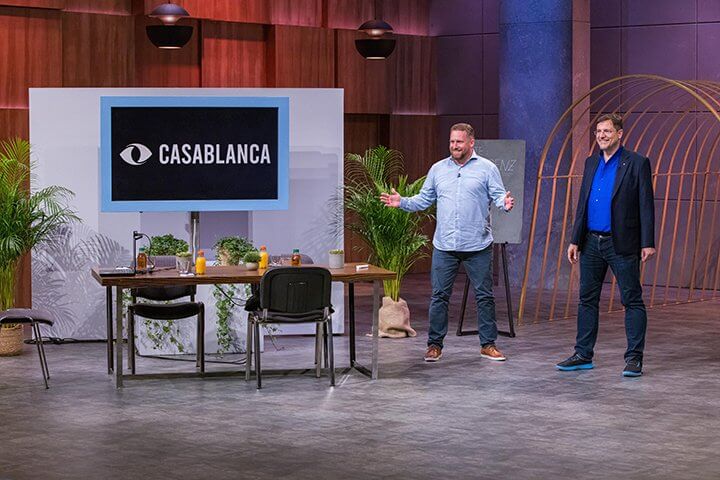Casablanca: Of hypes and warning signs #DHDL
There are always hypes in the start-up scene - trend topics in which almost all large and numerous smaller investors want to invest. The eScooter is probably one of them, as are online supermarkets and now artificial intelligence. Sometimes they are justified, sometimes not. But such hypes always play a special role in the fabric of the scene, which can also lead to completely different effects. As in the case of Casablanca in the first episode of the new season of "Die Höhle der Löwen".
Freitag,
12.04.2024

Of course, the first episode of the latest season had it all: in addition to exciting lion battles and extraordinary start-up stories, the AI start-up Casablanca not only appeared with an absolutely trendy topic, but also with an extraordinary deal and a very high valuation: the founders Carsten and Markus wanted €500,000 from the lions, but only gave up 5% for it, which corresponds to a company valuation of a whopping €10 million. And apparently without much turnover.
But there are big plans for this: the company wants to become a unicorn, i.e. be worth over a billion euros at some point. By the year after next, the company wants to have a turnover of 15 million and generate a pre-tax profit of 10 million.
And although a profit margin of 2/3 is extraordinary even for a software start-up – especially at such an early stage – this hardly seems to bother the lions. You would actually expect them to strongly attack the valuation, that they don’t like the small shares at all and that they would generally take everything apart quite critically.
However, at least in the material that made it into the cut, this was not really the case.
If we want to accept this as representative, we automatically ask ourselves: What could be the reason why investors are suddenly less critical than usual? If they suddenly seem to accept much higher valuations than they are normally used to?
One possibility, which does not seem to be entirely out of the question, is that this could be an absolute trend topic in the start-up world. An effect often referred to as „hype“, because sometimes no investor wants to stay on the sidelines because everyone believes that the „next big thing“ will come from this area.
Which is of course a bold bet, because often the really „big things“ like Open AI have long since become big by this point. And if you look at Gorillas & Co, you get the impression that hype has often overshadowed serious flaws in the business model.
Of course, the current AI hype cannot be compared with the long-past hype surrounding online supermarkets in terms of its fundamental structure; after all, artificial intelligence is a fundamental technology with numerous applications in a wide range of sectors, not a single business model.
The start-up Casablanca, for example, uses AI to calculate the three-dimensional shape of a human head and face from a two-dimensional image, enabling it to virtually „turn“ the head. This gives a video call partner the impression that the person they are talking to is looking directly at them, even though they are actually looking at their own screen. This should not only make video calls more pleasant and personal, but also more productive.
But is this technology worth 10 million euros at such an early stage?
In response to questions from the lions, it emerges that the founders do not want a supposedly simpler route such as early technology sales or licence deals with the top dogs of video call software. Instead, they want to turn their company into a unicorn. Unfortunately, it is not clear from the final TV version exactly how this is to be achieved, but Janna Ensthaler sees it as a hot game.
She also soon asks a very interesting question: why don’t the founders go to traditional VCs? The answer is a little surprising, as founder Carsten reports that it is still too early for them and that they are not (yet) prepared to pay the desired valuation, at least at this stage. But that doesn’t seem to have stopped him from going in front of the lions.
All this finally makes Janna Ensthaler so sceptical that she cancels: she is surprised that someone hasn’t already struck on this subject.
Is such a cancellation really „just“ a gut feeling, or is there more to it? It’s also important to remember that the lions have much less „material“ at their disposal for their decision than is normally the case with investors. But even outside the cave, it can happen that an investor hears that many other investors have cancelled a case that he himself considers to be very interesting. Even then, many experienced investors pause, look twice as closely and try to find out whether they have overlooked something.
Particularly in the case of hype topics, where investors are said to be less scrupulous, frequent cancellations are already an indication that something might not be quite as great as the founders make it out to be.
Carsten Maschmeyer seems to see things differently, as he enters the negotiations and accepts a valuation that may have surprised many viewers: €500,000 for 7.5% is the final deal, albeit with the option that the lion will receive a further 2.5% if he fulfils milestones that have yet to be defined. So, in addition to the very high valuation, he still has to prove himself in order to realise his target valuation of €5 million.
Normally, it is the other way round in such early phases, especially if the valuation is set high: the investors pay out the sum in tranches, and for each tranche after the initial payment, the startup must fulfil certain milestones for the payout. This ensures that ambitious plans such as a turnover of 15 million euros in the second year are not just castles in the air and the investor loses a lot of money to completely dreamy founders just because they sell well. Or are active in a hype area that drives up valuations. Incidentally, one of the biggest disadvantages of high valuations for the start-ups themselves lies precisely in these tranche and milestone agreements. Because the higher the valuation, the more ambitious and strict the milestones usually are.
We cannot say whether the contract would have included this in the end, but the investment did not materialise in the first place because the due diligence process revealed that the valuation had actually been set far too high.
Janna Ensthaler probably had the right instinct and another investor seems to have discovered something that is preventing him from investing in what is actually such a hot topic. Unfortunately, we will probably never know what it is in this specific case, but it seems to become more likely with every investor who cancels.
Photo (above): TVNOW / Bernd-Michael Maurer

Ruth Cremer
Ruth Cremer ist Mathematikerin und Beraterin sowie Hochschuldozentin auf dem Gebiet der Geschäftsmodelle, Kennzahlen und Finanzplanung. Als ehemalige Investmentmanagerin weiß sie, worauf Investoren achten und hilft auch bei der Pitch- und Dokumentenerstellung im Investitions- oder Übernahmeprozess. Seit 2017 ist sie als externe Beraterin an der Auswahl und Vorbereitung der Kandidaten in "Die Höhle der Löwen" beteiligt.
